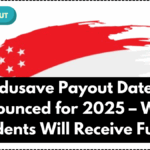Singapore is set to disburse a confirmed $800 payout to eligible lower-income workers this July 2025. This initiative is part of the nation’s expanded economic support agenda aimed at boosting financial stability for those most affected by rising living costs. The Ministry of Finance officially announced this segment of the Singapore aid package in early June, reinforcing the government’s ongoing strategy to narrow the income gap.

Table of Contents
Who Qualifies for the $800 Support in July 2025?
Eligibility is tightly focused to ensure assistance reaches those who genuinely need it. This round of low-income support targets employed Singaporean citizens earning a gross monthly income of $2,500 or below. Additional criteria include ongoing employment status and annual Assessable Income for 2024 not exceeding $34,000.
To avoid any application confusion, payouts will be processed automatically based on existing CPF and tax records. Beneficiaries do not need to apply separately.
Breakdown of the Singapore Aid Package July 2025
The $800 direct payment is only one component of the broader aid scheme announced for 2025. Here is a quick overview:
Component |
Benefit Amount |
Eligibility Criteria |
Disbursement Month |
|---|---|---|---|
Direct Cash Support |
$800 |
Singapore citizens earning ≤ $2,500/month |
July 2025 |
Utility Credit Supplement |
$150 |
Lower-income households with ≤ 4 residents |
August 2025 |
Grocery Voucher for Seniors |
$300 |
Seniors aged 60+ under ComCare or Silver Support |
October 2025 |
These support measures are a continuation of Singapore’s multi-layered assistance framework that has evolved since the COVID-19 period.
What Sets the July 2025 Payout Apart?
Unlike previous cash distributions, the $800 payout Singapore July 2025 package is uniquely timed and calibrated to address specific inflationary pressures forecasted for Q3. It also reflects a growing emphasis on wage sustainability. Policymakers have aligned this initiative with upcoming adjustments to the Progressive Wage Model, making it more than just a temporary financial booster.
Feedback from citizens and community groups played a key role in shaping the disbursement mechanics. The government streamlined eligibility tracking through CPF-linked employment data, reducing administrative delays.
Long-Term Impact of Low-Income Support Schemes
With Singapore transitioning into a slower-growth economy, such targeted payouts serve as economic stabilizers. Direct cash transfers like the one in July 2025 empower households to meet short-term needs while retaining spending power in essential areas like food, transport, and education.
Experts suggest this type of fiscal aid encourages social equity and preserves public trust. The continuity and reliability of these Singapore aid packages also act as morale boosts for lower-wage earners striving for upward mobility.
Conclusion
The confirmed $800 payout Singapore July 2025 initiative underscores the government’s commitment to equitable economic development. For many low-income workers, this will provide essential breathing space during a financially demanding period. With automation in disbursement and clarity in eligibility, this measure is poised to deliver real, timely support.
FAQ
Who will receive the $800 payout in July 2025?
Singaporean citizens with gross monthly earnings of $2,500 or less and who meet annual income criteria will be eligible.
Is any application required for the payout?
No application is needed. Payments will be made automatically based on CPF and IRAS data.
When exactly will the payout be credited?
Disbursement is scheduled for mid-July 2025. Official confirmation of payment dates will be sent via SMS and Singpass notifications.
What if I don’t receive the payout?
If you meet the criteria but do not receive payment, you may contact the Ministry of Finance hotline or visit your nearest Social Service Office.
Are other forms of aid available in 2025?
Yes, including utility credits and grocery vouchers, forming a broader aid framework for low-income households.
Click here to learn more





